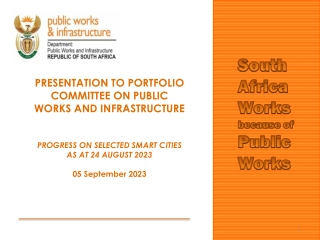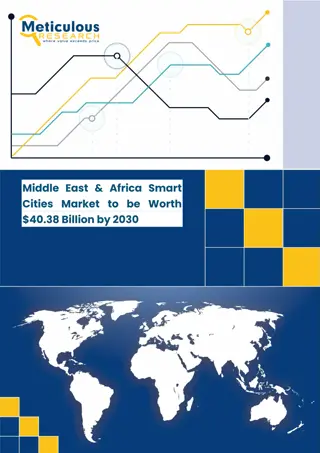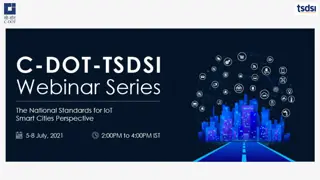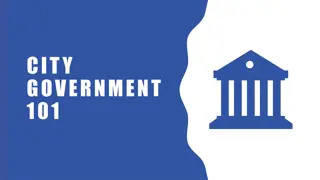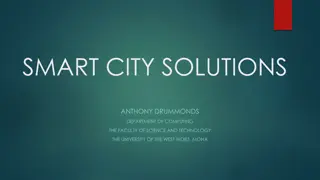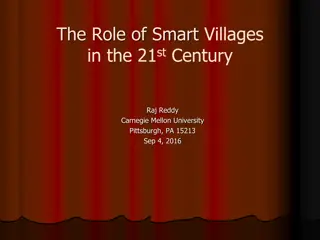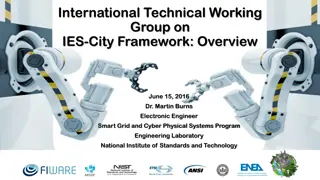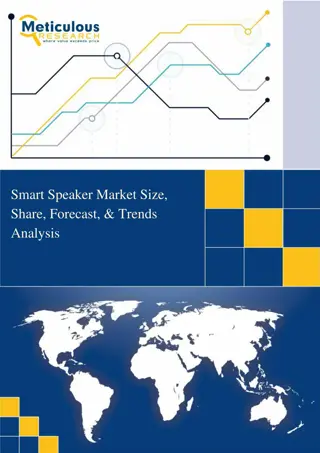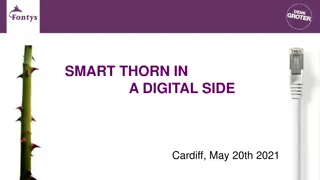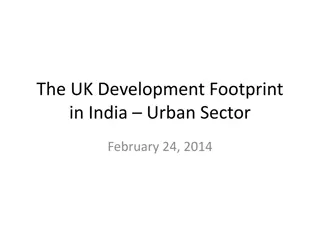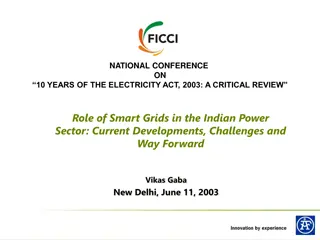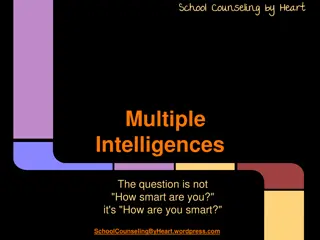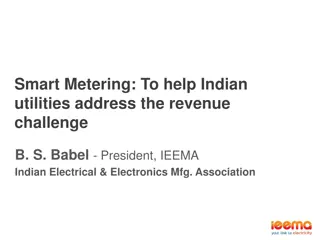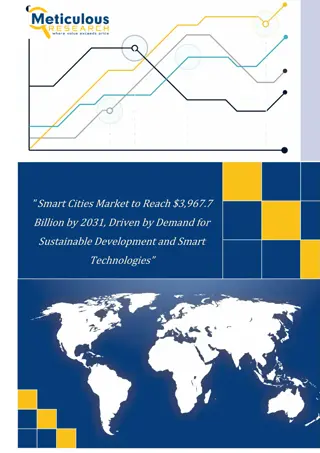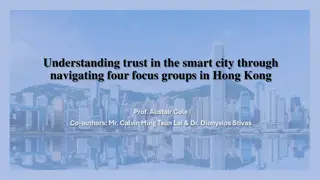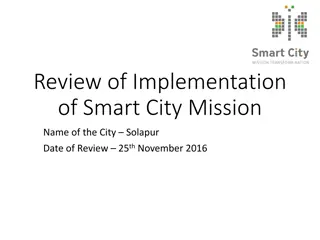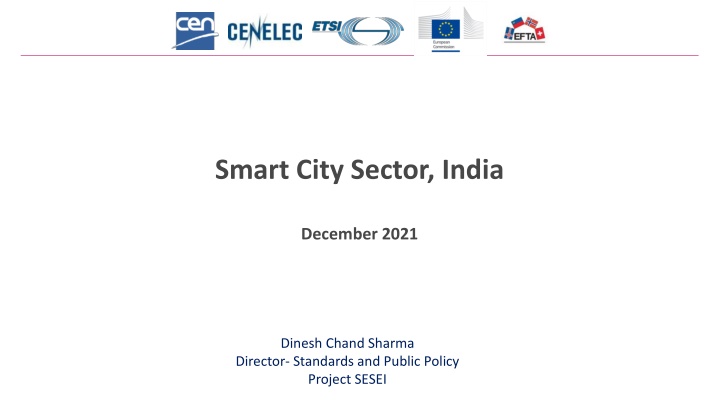
Smart City Sector, India
The Smart City Mission in India aims to develop 100 smart cities across the country to enhance economic progress and improve quality of life. Launched in 2015, the mission focuses on strategic development, core infrastructure elements, and government-industry initiatives to support urban development and technology integration. With a 50:50 financing model, the mission is set to transform urban landscapes and drive sustainable growth.
Download Presentation

Please find below an Image/Link to download the presentation.
The content on the website is provided AS IS for your information and personal use only. It may not be sold, licensed, or shared on other websites without obtaining consent from the author. If you encounter any issues during the download, it is possible that the publisher has removed the file from their server.
You are allowed to download the files provided on this website for personal or commercial use, subject to the condition that they are used lawfully. All files are the property of their respective owners.
The content on the website is provided AS IS for your information and personal use only. It may not be sold, licensed, or shared on other websites without obtaining consent from the author.
E N D
Presentation Transcript
Smart City Sector, India December 2021 Dinesh Chand Sharma Director- Standards and Public Policy Project SESEI
Contents Smart City Mission - overview Mission strategy Core infrastructure elements Status of the mission Government/Industry Initiatives to support the Smart City Mission Countries supporting Indian Smart City Mission Key Challenges Standardization Activities for Smart cities Conclusion Slide 2
Smart City Mission - Overview Slide 3
Smart City Mission Overview As per the Census 2011, Indian cities can accommodate nearly 31% of Indian population and contribute 63% of GDP. This requires comprehensive development of physical, institutional, social and economic infrastructure to improve the quality of life and attracting people and investment, setting in motion a virtuous cycle of growth and development. Government of India introduced Smart Cities Mission initiative on 25thJune 2015 to develop 100 smart cities all over the country and drive economic progress and boost the quality of life by fueling local development and harnessing technology to create smart outcome for the citizens. will be operated as a Centrally Sponsored Scheme (CSS) and Ministry of Housing and Urban Affairs (MoHUA) is responsible for implementing mission in collaboration with state government Process started with the formation of an implementing agency, a special purpose vehicle (SPV) which is promoted by the state/Union Territory and the urban local body and having a 50% equity shareholding of each side. Mission involves a 50:50 financing model with the Centre initially contributing Rs 500 crore (Euro ~58M) and the state giving an equal share for five years. SPV, formed as a limited company and is governed by the Indian Companies Act, 2013. Aimed to be completed by 2019-20, but has since been extended and now effective until June 2023 Slide 4
Mission strategy Strategic development (ABD) are: City renewal (redevelopment) City improvement (retrofitting)and City extension (Greenfield development) components of area-based Strategic development are: Use technology, information and data to make existing city-wide infrastructure and its services better. components of Pan-city For example, applying Smart Solutions in transport sector (intelligent traffic management system) and reducing average commute citizens, which will have productivity and quality of life of citizens. time or effects cost of on positive Another example can be wastewater recycling and smart metering which can make a huge contribution to better water management in the city. Slide 5
Core infrastructure elements Adequate water supply Assured electricity supply Sanitation, including solid waste management Efficient urban mobility and public transport Affordable housing, especially for the poor Robust IT connectivity and digitalization Good governance, especially e-Governance and citizen participation Sustainable environment Safety and security of citizens, particularly women, children and the elderly, and Health and education Slide 6
Status of Smart city mission Govt. selected 100 cities through a City Challenge Process of four rounds: In Round 1, 20 smart cities were selected in January 2016, and in May 2016, 13 more cities were selected in a fast-track round. In Round 2, 27 smart cities were selected in September 2016. In Round 3, 30 smart cities were selected in June 2017. In Round 4, 9 smart cities were selected in January 2018. Indian State Meghalaya s capital, Shillong, was included as the 100th city in June 2018 According to latest data provided by Ministry - MoHUA: total proposed investments for SCM stood at ~Rs. 205,018 crore ( 24.4 billion). 6480 projects worth 185,905 crore ( 22.13 billion) have been tendered, Work orders issued for 5845 Projects worth 157,369 crore ( 18.73 billion) and 3145 Projects worth 53,256 crore ( 6.34 billion) have been completed. Slide 7
Government/Industry Initiatives to support Smart City Mission Slide 8
Open Data Platform/India Urban Data Exchange (IUDX) IUDX, an open-source software platform for Indian Smart cities, facilitates secure and authenticated exchange of data amongst various data platforms, 3rd party applications, data producers and consumers. Platform is developed in partnership between Smart Cities Mission and the Indian Institute of Science (IISc), Bengaluru. Platform will provide full control to the data owners as to what data need to be exposed and to whom. IUDX, has successfully deployed operational data exchanges in 10 Indian cities and will now be entering its next phase to be deployed in 25 more smart cities Operational Cities are Pune, Surat, Varanasi, Agartala, Bengaluru, Bhubaneswar, Chennai, Bhopal, Faridabad, and Vadodara. Ministry of Housing and Urban Affairs (MoHUA) through Smart Cities Mission (SCM) has sanctioned INR 29 crores (Euro 3.4M) to support the ambitious goals of this program for the financial years 2021-22 and 2022- 23 IUDX has also become first software platform to fully adopt BIS standards for Unified Data Exchange Unified Data Exchange standard IS 18003, for Indian Smart Cities to ensure a secure and sustainable digital infrastructure and to facilitate the implementation of various smart city projects. Slide 9
National Urban Digital Mission On February 23, 2021, National Urban Digital Mission (NUDM) was launched by Ministry - MoHUA along with Ministry - MEITY, to establish a digital infrastructure & formalize a citizen-centric and ecosystem-driven approach to urban governance and service delivery in cities by 2022. Vision: to improve ease of living for citizens by creating a national urban digital ecosystem that delivers accessible, inclusive, efficient and citizen centric governance in India s 4400 towns and cities. Objectives: NUDM envisages few of the following objectives: To create shared digital infra as a public good in the shape of state-of-the-art digital urban platforms. To catalyze an urban national open digital ecosystem (u-NODE) that leverages NUDM. To establish registries at appropriate levels to a create single source of truth in respect of urban assets, service delivery, urban data and the actors. To promote the development of nationally scalable application systems with a special focus on achieving the Sustainable Development Goals for urban. To adopt the best principles of cooperative federalism while working with the States, Union Territories & Urban Local Bodies. To enhance the efficiency and effectiveness of governance at all levels. To create open standards and enforce the adoption of open standards by all national digital urban stakeholders. To strengthen existing urban systems and applications, by ensuring their conformity with the defined standards and integration with the proposed NUDM. Slide 10
SmartNet Smartnet is an initiative of Ministry of Housing and Urban Affairs (MoHUA) and is aimed: to create a resource-rich ecosystem of learning, sharing and dissemination for the city managers and primary stakeholders in the urban transformation of India. key objectives are: Providing a horizontal learning and knowledge sharing platform for exchange between cities, practitioners, academia, researchers and technologists. Evolving a comprehensive framework to visualize and articulate the government's urban missions such as smart cities, AMRUT, Housing for All, HRIDAY and Swacch Bharat. Smartnet also encourages Govt. to Govt.(G-to-G), Government (B-to-G) linkages in urban India for enabling transparent and structured interactions between cities, businesses and institutions. Govt. to Businesses (G-to-B) and Businesses to Smartnet provides a platform for industries to showcase their ideas and innovations developed for cities. portal will provide users real time information through City Dashboards, capturing changes at City level, project level information through geo-tagging of projects and latest updates on the progress of the urban sector missions. Slide 11
Smart City Living Labs Smart City Living Lab, an open-innovation ecosystem is set up at IIITH, with support from Ministry - MEITY, Smart City Mission, Govt of Telangana in collaboration with technology partners EBTC and Amsterdam Innovation Arena with an aim: to discover & develop cutting edge innovations with smart city use cases and enrich them with the knowledge from research. Living Lab shall help: Get expertise in IoT for Smart Cities related research and deployment Generate data for research Creation of a viable innovation and demand driven ecosystem in universities. Provide a test bench for IoT based Smart City implementations to start-ups as well as big companies IIITH campus would include different IoT verticals related to air quality, building energy, water quantity and quality, street lighting, etc. Project Urban Living Lab in Panaji, Goa is a joint initiative between India and Denmark and is implemented under the MoU between the Royal Danish Embassy and the Imagine Panaji Smart City Development Limited (IPSCDL). Slide 12
Freight Smart Cities Plan In July 2021, Commerce Ministry s Logistics Division unveiled plans for Freight Smart Cities The objective is to improve the efficiency of urban freight and create an opportunity for the reduction in logistics costs. The initiative encompasses the following plan: Phase I Identification of the initial 10 cities to be developed as Freight Smart Cities Target segment includes all state capitals and cities that have >1 million population Formation of city-level logistics committees in 10 cities including member participation from the government and the private sector These committees shall co-create City Logistics Plans such as promoting electrification of urban freight, building peri-urban freight centers, developing truck routes and managing night-time deliveries Expansion of initiative to next 75 cities in Phase II On the Freight Smart City initiatives, Logistics Division is also working closely with GIZ (Germany) under Indo-German Development Cooperation, Rocky Mountain Institute (RMI). Slide 13
Other Initiatives Slide 14
A group of people sitting in a room with a large sign Diagram Description automatically generated with low confidence Description automatically generated A group of people standing outside a building Description automatically generated with medium confidence Other Initiatives Other Initiatives Slide 15
Countries supporting Indias Smart City Mission Slide 16
Countries supporting Smart City Mission Leading economies worldwide have shown interest in India s smart city mission and are looking forward to participate in the development of smart cities: Spain has proposed to cooperate with India to develop Delhi into smart cities. The Barcelona Regional Agency of Spain has shown an interest in exchanging technology with India . Germany to support in developing Bhubaneswar (Odisha), Kochi (Kerala) and Coimbatore (Tamil Nadu) as smart cities . France to support three Indian cities Chandigarh, Nagpur and Puducherry and it has announced an investment of US$ 1.5 billion (EUR 1.3 billion) . Sweden, Israel, the Netherlands, the UK and Hong Kong have also shown interest in investing in India for developing smart cities. Italy to invest US$ 1.2 trillion over the next 20 years through numerous initiatives United States Trade and Development Agency (USTDA) to develop Visakhapatnam (Andhra Pradesh), Allahabad (Uttar Pradesh) and Ajmer (Rajasthan) as smart cities . Japan has decided to assist India with the development of Chennai, Ahmedabad and Varanasi as smart cities. Singapore offered to help developing Amravati, the new capital of Andhra Pradesh, as a smart city. Twenty cities across three Indian states Punjab, Haryana and Rajasthan are likely to have a fast-track development under a new Indo-Canadian initiative to train smart city planners on capacity building, governance, reform implementation, water supply and sewerage, among others. Slide 17
Key Challenges 1. Insufficient fund at state level 2. Absence of master plan or city development plan 3. Lack of advanced Technology Solutions 4. Cybersecurity risks Slide 18
Standards for Smart Cities Slide 19
Telecommunications Standards Development Society, India (TSDSI) TSDSI, an autonomous, membership based, standards development organization (SDO) for Telecom/ICT products and services in India, develop standards for access, back-haul, and infrastructure systems, solutions and services that best meet India specific Telecom/ICT needs, based on research and innovation in India. works closely with global standards bodies (3GPP, oneM2M, ETSI, etc) to reflect Indian requirements into international telecom/ICT standard TSDSI has transposed oneM2M Release 2 and Release 3 and handed over these releases to TEC/DoT for its adoption. Subsequently, TEC has adopted oneM2M Rel2 as national standard and is in the process of adopting oneM2M release 3 specifications as national standards. TSDSI has also produced a number of technical reports on M2M Use Cases in different verticals from Indian Context C-DOT, an Indian Government owned telecommunications technology development center, has also developed oneM2M standards based Common Services Platform (CCSP) for IoT which is of tremendous value to Smart city applications developers. Slide 20
Telecom Engineering Centre (TEC) TEC, National Standardization Body for Telecom and related ICT sector in India, issued its Standardization Guide A policy document for adoption of Domestic/ international standards into national standards in May 2020 TEC, after complying with the due consultation process and as per the Standardization guide, adopted TSDSI- transposed oneM2M Release 2 specifications as National standards and is also working on the adoption of oneM2M release 3 specifications. These standards will be quite useful for the development of interoperable ecosystem for IoT domain, especially for Smart cities. TEC has also prepared and released following technical reports related to smart cities: ICT Deployments and strategies for India s smart cities: A curtain raiser M2M/ IoT Enablement in Smart Homes Design and Planning Smart Cities with IoT/ ICT IoT/ ICT Enablement in Smart Village & Agriculture IoT/ ICT standards for Smart Cities (under preparation) TEC has also made a significant contribution to ITU-T Recommendation Y Suppl. 53 (12/2018) on IoT having five IoT use cases from India & one from Egypt. Y Suppl. 56 (12/2019) on Smart city having smart city use cases from Japan, Korea, UK and India. Slide 21
Bureau of Indian Standards (BIS) Bureau of Indian Standards (BIS), National Standard Body of India, through its technical committees have been developing standards related to smart cities. List of Standards developed by CED 59 related to smart cities Sl No IS_No Title 1 IS 17000 : 2019 Sustainable Development of Habitats Indicators Smart Community Infrastructure - Best Practices for Transportation - Guidelines 2 IS 17451 : 2020 Smart Community Infrastructure Guidance on Smart Transportation for Allocation of Parking Lots in Cities 3 IS 17456 : 2020 Civil Engineering Division Council CED 59: Smart Cities Sectional Committee 4 IS 17457 : 2020 Sustainable Development of Habitats - Vocabulary Electronics and information Technology division council (LITD) LITD 17: Information Systems Security And Privacy LITD 27: IoT and related technologies LITD 28: Smart Infrastructure LITD29: Blockchain and Distributed Ledger Technologies LITD 30: Artificial Intelligence LITD 31-Cloud Computing, IT & Data Centers List of Standards developed by LITD 28 related to smart cities Sl No IS_No Title 1 IS 802.15.4:2021 Low-Rate Wireless Networks (Adoption of IEEE 802.15.4) Unified Digital Infrastructure Data Layer Part 1 Reference Architecture 2 IS 18002-1:2021 3 IS 18003-2:2021 Unified Data Exchange Part 2 API specifications (includes NGSI-LD (ETSI CIM) 4 IS 18008-1:2021 Smart Cities- GIS Part 1 Reference Architecture 5 IS 18006-1:2021 Municipal Governance - Part 1 Reference Architecture 6 IS 18006-3-1:2021 Municipal Governance Part 3 Property Tax Section 1 Taxonomy 7 IS 18004-1:2021 IoT System Part 1 Reference Architecture (based on oneM2M CSF ) Slide 22
Conclusion Government is driving the Smart Cities mission, but progress is slow. Due to Covid-19 pandemic and other reasons have also caused delay in execution of most of the smart city projects, therefore government has extended the timeline for the implementation of Mission to June 2023 Financing is also the greatest challenge for smart city projects Smart city infrastructure requires a large capital investment Many states/union territories have failed to release their share of funds for the mission. Smart cities need greater cooperation within national and International experts Mission implementation and continuous monitoring. is indeed smart and evolving hence need careful planning, proper Standard based product and solution implementation is of utmost important Slide 23
Dinesh Chand Sharma (Seconded European Standardization Expert in India) Director Standardization & Public Policy SESEI C/O EBTC, DLTA Complex, Gate No 3, 1st Floor, 1, Africa Avenue, New Delhi 110029 Mobile: +91 9810079461, Tel: +91 11 3352 1525, dinesh.chand.sharma@sesei.eu www.sesei.eu www.sesei.in Slide 24

